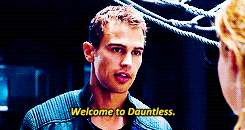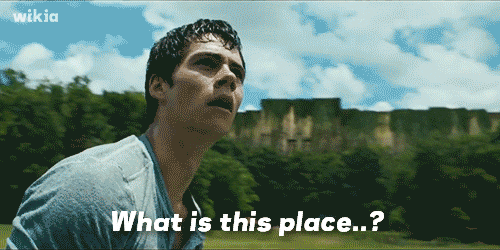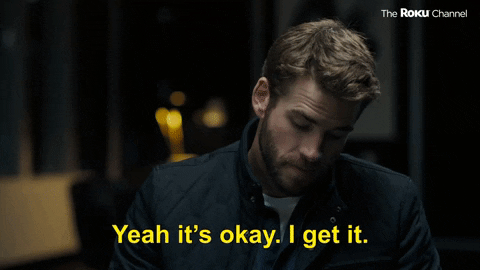Please beware of spoilers for The Hunger Games, Divergent, and The Maze Runner. Read my rant at your own risk lol!
“I think the Hunger Games series sits in a similar literary position to The Lord of the Rings, as a piece of literature (by a Catholic author) that sparked a whole new subgenre and then gets blamed for flaws that exist in the copycat books and aren’t actually part of the original.”
–A quote from @fictionadventurer on Tumblr
I know. Starting with a Tumblr quote is a bit of a sketchy start but hear me out. YA Dystopian novels are very popular topics of discussion among the Tumblr community, and I think that this particular user had a very valid opinion.
The Hunger Games is a fantastic dystopian novel that covers a vast multitude of topics and tropes, and unfortunately, as @fictionadventurer states above, many of the YA dystopian novels that followed it ended up being horribly boiled down and flat attempts at what Suzanne Collins did in the world of Panem.
In this essay/blog post I want to pose that while The Hunger Games by Suzanne Collins, The Maze Runner by James Dashner, and Divergent by Veronica Roth all present dystopian societies with oppressive governments, only The Hunger Games delivers a cohesive, meaningful, and impactful story, while the others fall short due to weak worldbuilding, inconsistent plots, and trend-driven tropes.

The Hunger Games: The Cream of the Crop
Unlike so many of its imitators, The Hunger Games delivers on the full potential of dystopian fiction. Suzanne Collins didn’t just build a world where the government was bad and kids were oppressed. She created Panem, a chillingly believable society rooted in inequality, exploitation, and the glamorization of violence. The Capitol doesn’t just control the districts; it humiliates and dehumanizes them by turning their children into televised entertainment.
What truly sets the trilogy apart, though, is its treatment of character and trauma. Katniss Everdeen isn’t a chosen one destined to save the world. She’s a girl trying desperately to protect her family, dragged into conflict she never wanted. After surviving the first Games, her trauma doesn’t magically vanish; it lingers, worsens after the Quarter Quell, and nearly consumes her in Mockingjay. Collins refuses to romanticize Katniss’s pain, showing instead how war scars people long after the battles end. In contrast to later series where protagonists bounce back with little more than angst, Katniss’s instability and slow, uneven healing makes her feel real.
The trilogy also maintains thematic cohesion across all three books. From beginning to end, it grapples with war, propaganda, survival, and the corrupting nature of power. Even the controversial ending fits the story Collins was telling. It doesn’t pander to readers with easy victories or neat resolutions. Instead, it asks us to sit with the cost of rebellion and the price of survival.
This is why The Hunger Games remains the benchmark for YA dystopia: it respected its characters, its themes, and its readers. It wasn’t trying to cash in on a trend; it was telling a story with weight and meaning. And that’s why, years later, it still holds up while so many of its successors feel like hollow copies.

Divergent: A Series That Collapsed on Itself
Divergent began with real promise. The first book introduced an intriguing world of factions, government conspiracies, and the threat of what it meant to be “Divergent.” Yes, it leaned heavily on the romance between Tris and Four, but there was enough political intrigue and mystery to make it exciting. Unfortunately, the series quickly unraveled.
By Insurgent, Tris and Four had become nearly indistinguishable in voice. Their perspectives blurred so badly that if you picked up a random chapter, you might not know which character was narrating. Worse, their relationship conflicts felt shallow and repetitive, offering no meaningful progression for the plot. Instead of deepening the world of their arcs, Roth bogged the story down with melodrama.
Then came Allegiant. This is where the series truly fell apart. Suddenly, we’re told that not just one, but both governments are corrupt and dangerous, both trying to annihilate the other. And our heroine must (shocker) save the world. And instead of building on the foundation she laid in book one, Roth tossed in new villains and motives that felt more like plot contrivances than natural development. And the most infamous choice? Tris’s death. Not only was her sacrifice narratively unnecessary, it robbed another character—her brother, who was finally ready to redeem himself—of a powerful and fitting redemption arc. His death would have carried weight. Tris’s, by comparison, felt like shock value for its own sake.
What makes the ending even worse is the aftermath. Four, Tris’s central love interest, eventually moves on and marries her best friend. This decision felt more like an insult to readers than a natural conclusion. And the bigger question, did the world actually get better??? I DON’T KNOW!!! The entire dystopian framework collapses, replaced with character drama that offers no real resolution. In the end, Divergent exemplifies everything wrong with YA dystopian knockoffs: a strong, promising start that buckled under weak worldbuilding, inconsistent character work, and a reliance on shock twists over substance.

Maze Runner: Wasted Potential
If Divergent collapsed under its own melodrama, The Maze Runner crashed because it never figured out what kind of story it wanted to tell. The first book is genuinely strong: an eerie, mysterious setting, an oppressive and unseen antagonist in W.I.C.K.E.D, and a group of characters whose desperation made them compelling. The setup had everything it needed for a gripping trilogy
Then came The Scorch Trials, which dragged the momentum to a screeching halt. What could have been an escalation of stakes instead turned into a meandering desert trek filled with arbitrary obstacles. Characters were forced into conflict with each other for no real reason, and the mystery of W.I.C.K.E.D became less menacing and more confusing. The narrative felt padded without delivering the answers readers were waiting for.
By the time The Death Cure arrived, the series had burned through nearly all of its potential. Instead of tying the world together or resolving its dystopian premise, Dashner killed off some of the best characters and offered an ending that felt more like a shrug than a conclusion. The solution to the Flare virus wasn’t a cure, or even a workable system for rebuilding society. Instead, the surviving characters are dumped on an island to wait out the apocalypse while the rest of humanity dies. It’s not cathartic, it’s not tragic. It’s just lazy.
And so again, another YA dystopian started off strong, but lacked the cohesion and purpose needed to stick the landing. What began as an exciting, character-driven mystery turned into a muddled story with no satisfying resolution. Just another example of wasted potential.
Conclusion
At their core, dystopian novels are meant to explore what happens when humanity is pushed to its breaking point by oppressive systems. They explore how people survive, resist, and either reclaim or lose their humanity. The Hunger Games understood that. Suzanne Collins grounded her world in real social commentary, treated her characters like real people, and followed through on her themes from start to finish. The result is a trilogy that still resonates today.
By contrast, Divergent and The Maze Runner, along with countless other YA dystopias that flooded the market, started with promise but collapsed under the weight of weak worldbuilding, inconsistent characters, and shock-value drama. They chased the aesthetic of dystopia without ever committing to the substance. Instead of depth, readers were handed contrived love triangles, incoherent endings, and empty gestures toward “saving the world” that never truly landed.
This is why The Hunger Games remains the gold standard while the imitators are remembered mostly for their disappointing finales. Collins didn’t set out to create a trend. She told a story about trauma, survival, and the cost of resistance. Everyone else tried to write Katniss and all they got was Gale (Ew.)

